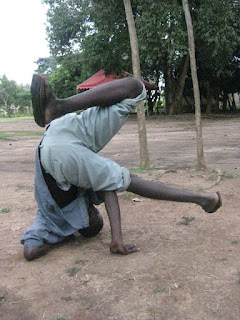-| 021011 |-
He should have known that traveling from India to Uganda would go awry when the
ticket counter looked at the passport, turned to the officer standing nearby,
and said, “Magno? Sir?” The officer looked at the name, swatted away
something in the air, and nodded.
Our Hero looked up from writing his name on the address tag
for his baggage and asked if something was wrong.
“No, sir. Thank you
for your passport.”
The rest of check in went as expected; he received the boarding ticket to
Dubai, he filled the emigration form, and earned a stamp in his passport for the exit from India.
Before he could pass through security, the x-rays, and metal detecting
guards, he wanted to know if he should dispose of the water in his
Nalgene. Walking towards the closest
security guard, Our Hero pulled the water bottle out of his bag and waved it in
the air.
Like a flock of seagulls on a discarded bagel half on Navy
Pier, or a flock of middle aged women at a
Josh Groban sighting, a flock of guards
descended and encircled Our Hero. The
eldest stepped forward.
“Sir, may I see your ticket and passport?”
Our Hero handed over the passport, which now contained three
visa stamps collected from the past five years.
“What is your purpose of visit to India?”
Hoping to simplify his explanation and cut back on the
chances of having to apply for a student visa, Our Hero explained that he was
traveling, and that he had visited a family friend in Bangalore.
“For study?”
No, not for study. He
had finished university and was taking a break for one year.
“And what did you study in university?”
Neuroscience.
“?”
Our Hero pointed to his skull.
“Is that a study in medicine?”
Sigh. At it simplest
form, yes. Our Hero did study medicine.
Our Hero shook his head furiously, incredulous at the
thought of attending such a school oriented for solely one topic of study at so early a point in his life.
“Where was your University?”
Maine.
“Your home?”
Chicago.
The questions flowed. Questions that seemed partially relevant to
Our Hero’s trip were asked: Why are you going to Uganda? [To go
to countries he had never been before] and What did you do in Jamaica? [built a
playground] and What did you do in Ecuador? [the same] and Did you get paid?
[no] and Why? [because he enjoyed things like that]. The
more questions the security guard asked, the more personal the questions became: Where
did you live in Bangalore? [HSR Layout] and Who did you visit there? [family
friends] and Where do they live? [in HSR Layout...] and Where did you stay [didn’t he just say HSR Layout?] and Where else did you go during these two months? [New
Delhi, Koramangala, Mysore, JP Nagar, Wilson Garden, Peenya] and What does your father do? [bookkeeper at a hardware store, but he just received his nursing degree] and How did you pay for University? [hard work, scholarships, the like] and What is in
your check in bag? [clothes, toiletries, chargers, snacks, medicine, gifts, a larger backpacking bag].
Thinking he had done a thorough job of answering the
questions, Our Hero looked forward to sitting in the waiting area.
“Mr. Magno,” the security guard continued, and Our Hero’s
internal set of eyes rolled, “do you want us to look through your bag?” The security guard’s eyebrows raised, his
body leaned forward, and Our Hero assumed this was his way of asserting his dominance and masculinity. He preferred his luggage stay intact, but if the guard were to do so, Our Hero had no choice. Besides, he had nothing to hide, ergo, nothing to be found. The security guard nodded to one of his four younger
henchman, who left around the corner.
Our Hero assumed he was getting the bag.
Major sigh. This was going to take a while.
Waiting for the younger security guard to return, Our
Hero asked if there was a problem.
“Yes, there is.” The conversation died at that.
Our hero found himself with the five security guards in what
he assumed was supposed to be an interrogation room, but the microwave and
table salt and pepper shakers and ceramic box of sugar packets made it appear more like a breakroom in Home Depot.
Our Hero felt immediately at home.
The leader asked Our Hero to remove the lock from the bag,
and the five guards began to resemble vultures tearing away at a dying zebra;
what had taken the entire morning to strategically stuff into the backpack and
duffel bag was now splayed across the table in a matter of seconds.
“What is this?” One
guard asked, holding up a black rubber case.
It was a gift a friend had given him earlier that year, which contained
adapters to a small, solar-powered charger.
“And this?” Another
guard held up a small grey chunk of plastic.
Our Hero’s father had given him a battery-powered mosquito repellant fan
that now in Our Hero’s mind resembled what could have been considered a bomb. Not that he had ever seen something of the like before.
“What are these tablets for?” The leader asked, holding up a packet of
denture cleaning tablets. “You wear
dentures?” He asked, and
Our Hero explained how he wore retainers, and then proceeded to explain how
such retainers were cleaned with the tablets and a cup of water.
A third guard handed the leader a taped pack of detergent
soap, leftover from his stay in India.
The Leader removed the tape, pinched some of the powder and sniffed it,
and proceeded to have a difficult time resealing the pack. He gave up, and tossed the opened bag of powder back into the duffel.
The fourth guard looked at the pair of gym shoes and the
flip flops, and the leader demonstrated how to probe the inside of the shoes
and check beneath the rubber inserts.
Our Hero asked if there was a reason they were searching through his bags.
“We think your travel plans are suspicious," the leader said, grimacing at the thought of traveling from India to Uganda with a one-way ticket.
Was that all? What a relief.
And here Our Hero thought it was something serious.
The first guard pulled out a plastic bag of clothes, and his
hand dove in to search for anything that wasn’t made of cloth. Our Hero grimaced, and explained how that
particular bag of clothes was full of ones that he hadn’t had the chance to
wash yet. The guard slowly removed his
hand and pushed the bag aside.
“What is this?” the
third guard asked, holding up a plastic bottle of contact solution. For his eyes, for his lenses.
“Why do you have so many lenses?” The second guard asked, holding up a
box. This time, the leader answered in Our Hero’s defense. “He’s
traveling for one year,” he said, rolling his eyes, “of course he has to carry
many lenses.”
“You wear SPF 50?”
The third guard asked, holding up a small container of sunblock. Yes, but only because his mother bought it, thus having no choice in the matter. “It’s
too high. The number is too big,” the
guard said, tossing it back into the bag.
"You found an Indian girlfriend," the leader said, holding up a pink foil-covered gift, onto which a peacock feather and a computer printed image of Jesus was taped. No, not a girlfriend, but the Little Prince from the children's home whom Our Hero had gotten close, and already terribly missed.
“Okay, well help us put all of these things back into your
bag.” Our Hero attempted to first explain how to repack the bag. At his frustration, he finished doing it all himself. Although he believed the search to be finished,
the leader asked to look into Our Hero’s carry on bag.
Major, major sigh.
Our Hero raised his eyebrows in amusement while watching the guards figure out that a sweater
could compress into its own pocket, that shampoo and soap bottles could come
in small sizes, that retainers actually do look like they’re molded from teeth, that someone had the patience to read a book sized like
The Count of Monte Cristo, and that Mickey Mouse's [thanks, Sis] shorts were filled with silicon beads, not
drugs. Restuffing this bag with poor care, the leader
then asked to look at Our Hero’s wallet [as if he hadn’t shown enough forms of identification to apply for the Russian Tourist Visa]. The leader looked at Our Hero’s credit card, debit card, then
driver’s ID.
“I’ve been to Chicago, last year.” Our Hero deduced that was the leader's attempt at kindness, trying to carry small talk in
the middle of the inspection.
“Okay, well, we’re sorry for the inconvenience,” the guard half apologized with a smile, “You can go now, Mr. Magno.” Our Hero smiled, and looked at his
watch. It had been almost an hour since
he began talking with the guards.
“Safe travels, god bless you, and go to Johns Hopkins, okay?”
Okay, Sir. He made a mental note to tell his parents that the guard who probed every inch of his possessions for the year gave him valuable life advice and direction. Our Hero turned to go through the metal detectors, and
realized he still didn’t know about whether or not water in his Nalgene was allowed. He turned to ask the leader.
“Oh, I don’t know. I
don’t know much about security regulations here.” With that, the man turned on his heels and walked towards the
Cafe Coffee Day | Indian Equivalent of Starbucks.
Our Hero hoped this wasn't an omen of things to come in Uganda.
[Suspicious Traveler]

























